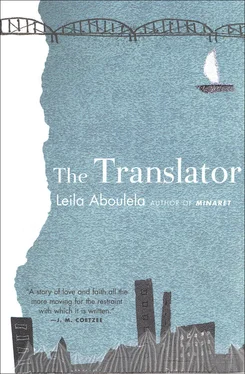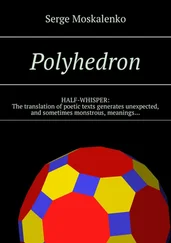What kept her going day after day: he would become a Muslim before he died. It was not too much to want, not too much to pray for. They would meet in Paradise and nothing would go wrong there, nothing at all.
Yesterday she and Mahasen had gone to visit Tarig’s grave. Driving out of the city to where there were no buildings blocking the wind. Travelling and finding flat ground, sand, knowing Tarig was there. Greeting him and all the others. Her aunt sat down on the ground, not moving, the Qur’an unopened on her lap. They found dirty things on the graves, things that the wind had carried through the barbed-wire fence. Orange peel, an empty cigarette carton, the remnant of a nest. A Miranda bottle top, indented and blurred. It grazed Sammar’s hand when she picked it up. She started to clear the ground, on her hands and knees reaching out, careful, she must not step over the people lying underneath. ‘We should get that keeper fired, he should be doing this,’ she said to her aunt but got no answer. She was afraid of finding worse than the rubbish she was now collecting: the signs of stray dogs. The keeper’s job was to keep stray dogs out, keep the cemetery clean, protect the graves from thieves. But he was not, thought Sammar, as a keeper of graves should be. He did not have clean white hair, a prayer mat, a melodious voice which recited the Qur’an. Instead he was young and gangly with broken teeth and a smell of hashish. Now as she gathered the rubbish, he stood leaning on the wall of his room, leering at her from far away. It made her angry and she went up to him and said, ‘If I find dog-shit, you will have to start looking for another job.’ He whined some excuse and skulked into the darkness of his room. She shouted after him, ‘I am not joking, you know.’ She felt safe with all the graves around her, all the truth. Cleaning up: a greasy newspaper page with the familiar face of a politician, a razor blade, some leaves. When she finished, she washed from the tap near the keeper’s room, made wudu again. She sat next to her aunt, put her arms around her, kissed her cheek. Then she took from her the Qur’an and started to read, word after word, verse after verse, page after page.

‘Come in for a while,’ she said, when Nahla stopped the car in front of the house.
‘No thanks, there’s no time.’
‘Come and show the cards to Aunt Mahasen.’
‘I’ll come in for a little while. But I might as well park the car at home.’
While Sammar waited in the street so that she and Nahla could go in together, she spoke to Rae. She told him about the poster she had seen in the video shop, an advertisement for an American film, the actors’ names written in Arabic and English. She told him how the film’s name was translated in Arabic. ‘Look Who’s Talking,’ she said, ‘became in Arabic, Me And Mama And Travolta’. He laughed and said, ‘That’s a much better name’. He laughed and she saw Hanan driving round the corner, Amir in the front seat, Dalia in the back. When they saw Sammar waiting at the door, they started to wave.
She pushed open the black metal door for them so that Hanan could drive into the shade of the car-port. The door was heavy and it dragged on the ground, making grooves.
Hanan parked the car, switched the engine off. Amir and Dalia jumped out and the sounds of greetings was mixed up with the sound of slamming doors. ‘There’s a letter for you,’ said Dalia and hope was a reflex, as silly as blinking.
Sammar reached for the envelope, the platinum face of the Queen, pearls around her neck. But she would know his handwriting. This was not his handwriting. She should not have hoped, this was not his handwriting.
Instead her name was written in Arabic, the envelope stamped in Stirling. Intrigue and the feel of paper tearing, the children’s voices, Nahla greeting Hanan.
The signature first. Fareed. Fareed Khalifa? Why would he write to her? The memory of meeting him in Aberdeen, Rae introducing them. Questions, he asked a lot of questions, he used to be a journalist and he was imprisoned by the Israelis. ‘They gave him a rough time,’ Rae had said, ‘they gave him a real rough time.’ Skim the lines of polite greetings, search and Rae’s name was there. At last after all the months of just wanting his name. Here it was, I am writing to you on behalf of my friend Rae Isles. Skim the lines down the page:… became a… about four months ago… at my house… how pleased I am that Allah had expanded his heart to this… Ramadan… your permission… if you accept…
Again, go over it again to catch every word, to really believe. The rush of this new knowledge, the feeling of being lifted up. She could even see herself, her head bent over the letter, her smile. Red flowers on her scarf falling on her shoulders. The navy cardigan, buttons undone, her folded sunglasses sticking out of the pocket. Her skirt touched the faded straps of her sandals, was creased at the back from sitting in the car. And the easy way she moved away from the children, away from Hanan and Nahla, away from the car-port to the garden. For she was being honoured now, she was being rewarded. All alone, a miracle for no one else to acknowledge but her. The sky had parted, a little crack, and something had pierced her life. Under the eucalyptus tree and the sound of the birds, kneel down… the clean Vicks smell of the leaves in the shade and on the grass.
Later that same day, she wondered where she could find privacy in the house, away from the clamouring children, the questioning women. They had not seen her look like that before: lit up, transformed. They were used to her being a ghost, walking about doing chores, her mind elsewhere, listless, not particularly driven. Now they asked her questions, but she would give nothing away, her dreamy smile, her secret… When to find privacy in this house… a time of day when she wouldn’t be needed, wouldn’t be missed. Where to go? Somewhere cool, dim and peaceful.
The television was her friend, the video of the talking baby came to her rescue. Everyone watched enthralled by the charm of Travolta, the beauty of the new mother, the wise words of the infant, translated in Arabic, white words across the bottom of the screen. Mahasen lay on the bed, propped up on one elbow, Hanan was on the opposite bed, a younger mirror image, her husband sat on the armchair with Hassan on his lap and the children were with their egg sandwiches scattered on the floor.
Sammar opened the door of the store room. The musty smell of a room not used, not aired, a smell of dust and rice. She switched the light on. A bulb dangled down from the ceiling, the dust that coated it gave the room a brownish, dull light. Among the large sacks of lentils and beans, among the huge cooking pots that were only needed in special occasions, was the suitcase where her winter clothes were folded up. Her duffle coat, her lined skirts, her gloves, all the clothes she had worn in Aberdeen, the clothes Rae had seen her in. There was dust on the suitcase, with her finger she could write her name through the dust in big loops. But she was here to write in response to Fareed’s letter. It was in her pocket now, she had carried it around all day. It was with her when Nahla showed the wedding cards to Mahasen, during lunch, while washing the dishes after lunch, struggling with Amir and his homework… It was her secret, she would put her hand in her pocket and feel it, she would take it out and read it at every chance. Every chance. Now it already looked worn out and crumpled: stained with kitchen water, egg from the children’s sandwiches, Amir’s fingerprints when he had tried to snatch it from her hands while she was helping him with his multiplication homework.
Читать дальше













